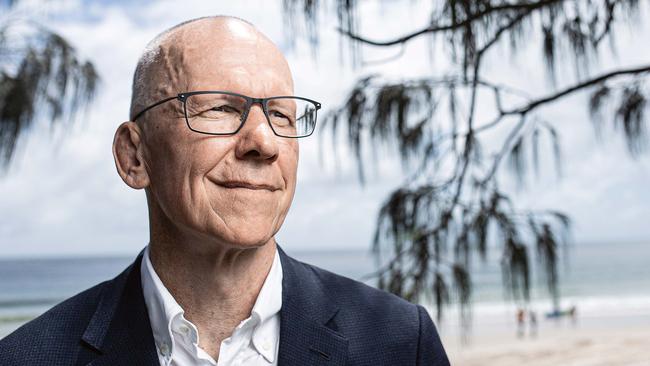Australia’s Richest 250: Geoff Wilson’s love of the game
One-time aspiring vet discovered his true passion in funds management.

If Geoff Wilson needed a reminder that political feelings are still running high regarding his election-changing campaign to ensure retirees keep their franking credits, he got it while in a lunch line.
Before Christmas, Wilson was about to order at the casual diner Kitchen by Mike in Sydney’s CBD when he spied Labor opposition leader Anthony Albanese in the queue just ahead.
“I waited until he ordered – it is like a cafeteria – and then I introduced myself and said ‘I’m Geoff Wilson and I’m happy to sit down and tell you my point of view about franking credits any time’,” Wilson recounts.
“He slightly recoiled, looked straight back at the cash register and just said quietly ‘no thanks’. That was the closest I’ve got with the ALP about their franking policy.”
Wilson jokes that he hasn’t had any thank-you cards from Prime Minister Scott Morrison, but there’s little doubt his voluble campaign to protect the interests of the tens of thousands of retirees with self-managed superannuation funds during the election campaign irked Labor, then-leader Bill Shorten and his shadow treasurer Chris Bowen.
Ahead of the 2019 federal election last May, Labor had controversially proposed making franking credits attached to dividends, which had been refundable for almost 20 years, non-refundable, upsetting retirees who relied on the refunds to top up their incomes after they’d stopped working.
Wilson had swung into action, marshalling an online campaign, making constant media appearances, and even being photographed on picket lines alongside retirees wielding placards bearing slogans such as “stop the retirement tax”.
It seems quite a change for someone who had knocked back a career as an industrial chemist to become a funds manager. As fellow fundie Alex Waislitz notes, though, Wilson had long been capable of putting something akin to an investor army together given the sheer number of ordinary people with shares in his $3.5 billion Wilson Asset Management.
“To his great credit, Geoff has identified the opportunity of empowering retail investors from all over the country – not just major cities – and giving them an opportunity to have access to skilled professional management,” Waislitz explains. “He has understood early the value of being a very good communicator and verbalising his messages to his thousands of investors, and puts in the effort to reach out to them through roadshows and investor briefings.”
That skill was to come to the fore before the last election.
Wilson has long been a prominent name in financial services and debuts on The List this year with an estimated fortune of $511 million, based on the value of his investments and his stake in WAM and other assets. But getting involved in politics was a different matter altogether.
One incident sticks in his mind, from September 2018, as his online petition against Labor’s policy started gaining traction and the issue began being discussed more broadly.
“One night we got an email from Chris Bowen saying ‘I didn’t sign up to your online petition, and the petition is a sham’. It was a bit strange ... so we got the data the next day and saw that between 11.10pm and 11.30pm, 10 Labor politicians all signed up from the one IP address. One of them was ‘Chris Bowen’, another was ‘Bill Shorten’ and eight others were Labor frontbenchers.
“What I suppose happened is one of them had given a backpacker $50 or something to gso down to an internet cafe and put in all these email addresses and sign up.”
Wilson told his staff to wait and see what happened, wondering when the news would leak to the press. It took two weeks. “So we knew it was Labor. That was just a taste of how brutal politics is. The corporate world may be tough, the political world is brutal. They were trying to set us up.”
Wilson hung in there – the publicity at least helped his petition grow from 12,000 to 19,000 signatures one week – but had little expectation of a Coalition victory on May 18. Instead of watching the election night coverage, he and his wife Karen rented the 2017 movie The Party on iTunes. By 7.30pm Wilson had started getting a stream of text messages from WAM employees and switched to the vote count. “Luckily we weren’t enjoying the movie. We’re not that keen on dark humour.”
The Coalition went on to win and Prime Minister Morrison remains in power. Wilson believes the franking credits issue played a big part.
“I believe it was Labor’s downfall,” he says. “The biggest swing against Labor was among 25 to 36-year-olds, [who are] the children or grandchildren of people were going to be impacted.
“I remember doing a presentation in Brisbane two days after the election. One of them stood up and said he’d been paying into his super since the early 1960s and had seven grandkids – five of voting age. He’d sat them down a number of times to discuss the impact on him. They all changed their vote and will never vote Labor again.”
After the election, in November, Bill Shorten took to Twitter to say: “Were the universe to grant re-runs, I would ... take a different position on franking credits.”
As the dust settles, Wilson remains ready to campaign given Labor is yet to change its policy. But he has settled back into day-to-day stock picking at WAM. The company manages more than $3.5 billion for 80,000 clients across six listed investment companies and other vehicles, and Wilson has a team of about 35 employees.
It is something he never imagined during a Melbourne childhood, in which the aspiring vet and son of a doctor wondered why his dad would spend so much time each day looking at a strange page in The Age newspaper with lots of numbers across it. Wilson’s father had inherited some stocks from his late father, and patiently explained to Wilson the intricacies of reading the stock tables. Some lessons stuck, and Wilson kept up an interest, even if the method he employed when making his first buy lacked the rigour he puts into picking stocks today.
“In those days we were going to have a mining boom, which we never did, and the gold price was going to go through the roof, which it never did. So I thought I’d buy some shares in a company called Timor Oil and Gas, the cheapest I could find. I did no research on it though, I just thought it sounded good.”
He had borrowed $1000 from his father and figured he’d make $200 if the 10c stock went to 12c. It did, and he sold half and kept the remainder to see what happened. It ended up going past 30c because, unbeknown to Wilson, the company was drilling an oil well and the stock had run up in anticipation of a good result.
Wilson had wanted to be a vet, but his school marks were not high enough to gain him entry to the veterinary science course. (He did make the grade in New Zealand, only to knock it back after discovering he would have to live there for three years.) Instead, he qualified as an industrial chemist and worked at The George, a rough pub in South Melbourne where fledgling bands such as Men at Work and Midnight Oil played. Having rejectd a full-time position managing a pub in Richmond, he says he took a year to find a job as the economy slowed during the Fraser government years. He was knocked back by Cadbury-Schweppes, Containers and McPhersons, before finally winning a role in the investment department of financial services firm Scottish Amicable.
“I knew nothing about the market in 1980,” Wilson recalls. “But your early jobs are very informative in what they teach you. They were very much about getting out there and talking to companies. We’d drive up to Maryborough and see Maryborough Knitting Mill, or get around town talking to management. They were very open.
“I learnt how valuable it is meeting management of companies you might invest in. It is one of the major pillars of my investment philosophy. Get out there and meet people.”
Wilson would then become a stockbroker with Potter Partners, moving to Sydney and then New York in the heady days before the 1987 market crash. It was a time, he remembers, when “you’d have a US broker who would ring and say ‘let’s have dinner’ and you’d get there and he’d already ordered Cristal Champagne. Or we’d get a limo and head to the Tuxedo Club [outside New York], play tennis and then come back.”
They were the heady days of needing new suits and deciding to fly to Italy to buy them, but it would all come crashing down in October 1987 when the market started falling on a Friday – “the market was down 108 points, the most since the 1929 crash, so we went and celebrated thinking we’d seen history” – only for it to keep dropping the next Monday.
Wilson had sold some of his shares months earlier, but had still wondered if the market would bounce back. The panic, though, would teach him another valuable lesson.
“I remember talking to a client and really questioning the market, but he said ‘if you are a capitalist, you have to buy’. That was sage advice, because within a couple of years the market was back to its highs. So the lesson is you have to be patient. You really have to work against your emotions. The bizarre thing, I suppose, is you have to be excited about buying when other people are panicking.”
Wilson later returned to Australia and worked as a broker, putting in long hours. But after reading Charles Handy’s book The Empty Raincoat: Making sense of the Future, he decided he needed a change. A lunch with former media executive Tim Hughes, then running the private investment office of Reg Grundy, rammed home the point.
“He said: ‘Why do you keep broking? It is a mouse trap’. It was paying me well but it was killing me. Tim said, ‘What do you want to do?’ I said I wanted to manage some money. I thought I’d set up a boutique funds management firm, maybe write a book, and spend more time with my wife and daughter. I was happy to have good stress but it was about having balance in life. “
Hughes offered some seed funding and office space at Grundy’s RG Capital, though Wilson was surprised when at the last minute he was asked how much of his own capital he was putting in. He scraped together $500,000, Grundy matched it and what was to become WAM was born on January 1, 1998.
Fellow fund manager David Paradice had an office next door and reckoned he could tell by walking past how interested Wilson was in a particular stock. “If he was in there talking to someone and thought the stock was good, he’d have this habit of pulling up his trouser leg at the bottom. The higher it went, the more he liked the stock,” he says.
Journalist Ross Greenwood would become a WAM board member when it raised $20 million to float on the ASX as a listed investment company in 1999, with funds under management of about $25 million across three funds. “Geoff was one of the first public LICs to take performance fees, so he had to perform to get paid,” Greenwood says. “The irony is if he’d stayed private he probably would have got paid more like others, but he thought it was fairer to his investors that way.”
Since then, Wilson has methodically kept building the business, embarking on a constant round of investor roadshows and share-holder presentations. There is no hiding out for most of the year only to pop up for an annual general meeting, as with many public companies. Greenwood says he has become battle hardened over time as a result of takeover battles for other LICs, disagreements with the management of companies he has invested in, the franking credit fight, and even having underperforming stocks over the short-term while trying to focus on long-term stock trends. “It is hard when you’re underperforming and your rivals are marketing against you and briefing against you,” Greenwood says. “But Geoff has withstood all that and it belies his otherwise genial nature.”
Wilson laughs when asked if he has any retirement plans, saying he thought he had retired at 40 to set up a funds management business. Instead, his goal is to at least be in the business for 18 years, until he’s 80.
“I love it,” he says. “It is the game. It is about backing good people and the importance of sitting down with management, understanding how companies make money and what the drivers are. It is about collecting information, from the uber driver or the taxi driver, the grocer, anyone.
“What is happening in the world, the markets are a reflection of that. There’s plenty of time to see more cycles.”



